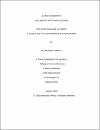The Ulama and the Al Saud: A Relationship Between Elites in Saudi Arabia
Abstract
The origins of the Kingdom of Saudi Arabia date back to the alliance forged between the AlSaud and the preacher Muhammad Ibn AbdulWahhab in the 18th century, and the subsequent establishment of the first Saudi state. Since then, the religious scholars, or ulama, have played an important role that is still vital to the continued survival of the Saudi regime’s credentials. However, that role has changed overtime. Historically, the AlSaud and the ulama were elites of equal standing, but oil resources, bureaucratization and modernization have altered the state-society relations, and decreased the influence and importance of the religious establishment vis-a-vis the state. The purpose of this thesis is to examine the role that the ulama play in the political structure of Saudi Arabia, and how, this role has changed over the course of the last three-hundred years since the Saudi-Wahhabi alliance was established. As such, it investigates whether the Saudi ulama continue to be a primary elite, or if in fact they have fallen to the level of secondary elites. The main conclusion reached is that in the century since the unification of the Kingdom of Saudi Arabia by AbdulAziz ibn Saud, the political elites, namely the royal family, have systematically co-opted the ulama, and effectively rendered them government bureaucrats that are dependent on the AlSaud for their power, employment, and consequently their influence and wealth. Thus, it is argued that the ulama have become secondary elites, dependent on the primary elite of the AlSaud for access to resources. This research relies on both secondary and primary sources, such as interviews with academics, policy-makers, and citizens; media sources; fatwas; and royal decrees.
DOI/handle
http://hdl.handle.net/10576/5084Collections
- Gulf Studies [68 items ]


